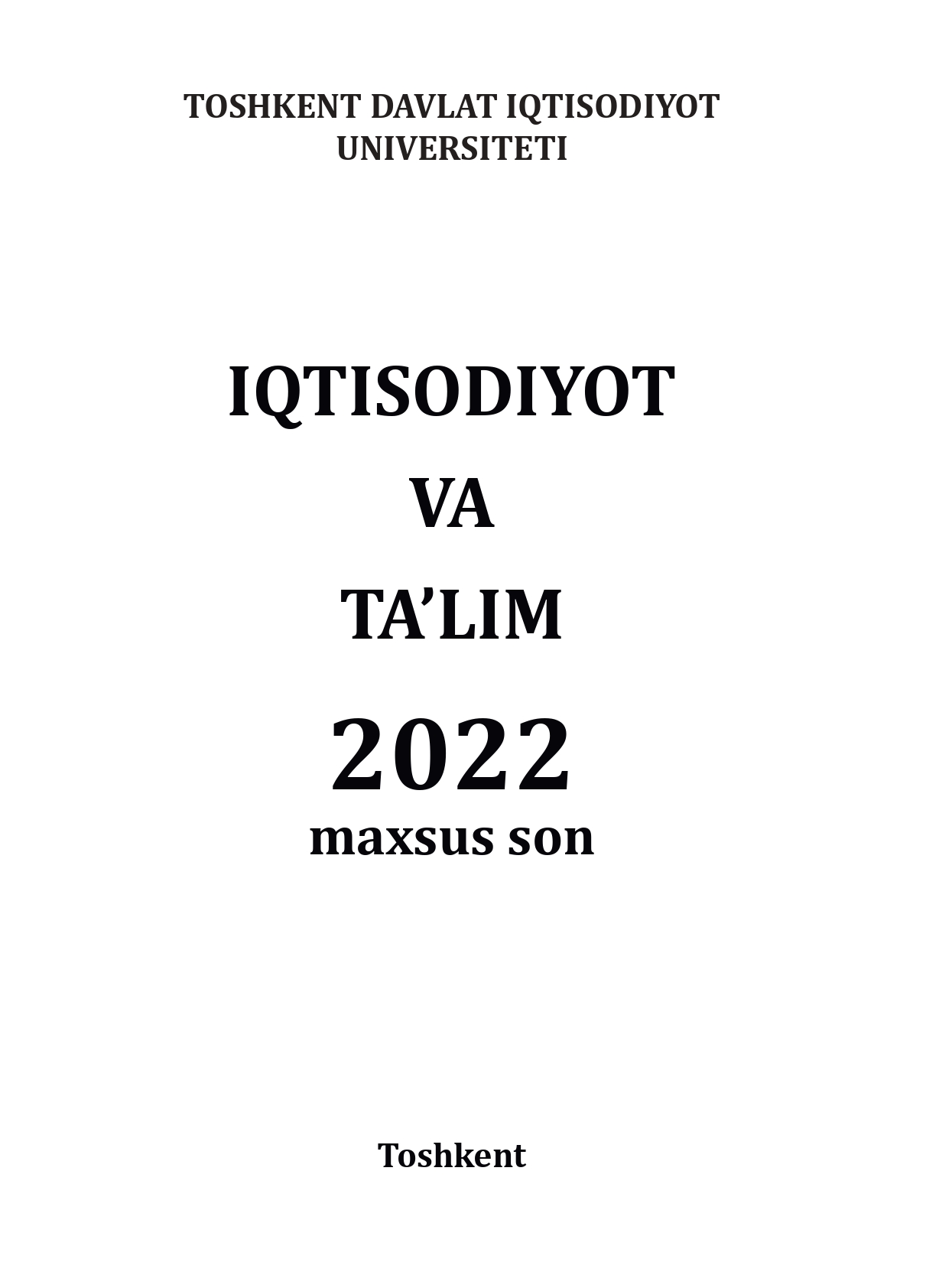Abstract
The article considers the possibilities of organizing women's labor in an innovative economy, namely intellectual labor, entrepreneurship, as well as organization issues through the widespread use of information and communication technologies. In this regard, the theoretical studies of modern economists are deeply studied, the hypothesis is analyzed using the SEM model and the corresponding conclusions are drawn
References
Мирзиеёв Ш. Янги Ўзбекистон демократик ўзгаришлар, кенг имкониятлар ва амалий ишлар мамлакатига айланмоқда Ўзбекистон Республикаси Президенти Шавкат Мирзиёевнинг “Янги Ўзбекистон” газетасига берган интерьюси 17.08.2021 https://president.uz/uz/lists/view/4547;
Sirianne Dahlum, Carl Henrik Knutsen, Valeriya Mechkova, Women’s political empowerment and economic growth, World Development, Volume 156, 2022, ISSN 0305-750X, https://doi.org/10.1016/j.worlddev.2022.105822. (https://www.sciencedirect.com/science/article/pii/S0305750X22000122);
E. Duflo Women empowerment and economic development. - Journal of Economic Literature, 50 (4) (2012), pp. 1051-1079; B. Esteve-Volart Gender discrimination and growth: Theory and evidence from India. - SICERD Development Economics Discussion Paper 42, London (2004); S. Klasen, F. Lamanna The impact of gender inequality in education and employment on economic growth: New evidence for a panel of countries Feminist Economics, 15 (3) (2009), pp. 91-132;
World Economic Forum Digital Transformation Initiative in Collaboration with Accenture: Unlocking $100 Trillion for Business and Society from Digital Transformation. Executive Summary (2018) Retrieved from http://reports.weforum.org/digital-transformation%0Ahttp://reports.weforum.org/digital-transformation/wp-content/blogs.dir/94/mp/files/pages/files/dti-executive-summary-20180510.pdf, Accessed 21st Nov 2021;
ILO - International Labor Organization ILO Centenary Declaration for the Future of Work (2019);
Retrieved from https://www.ilo.org/global/about-the-ilo/mission-and-objectives/centenary-declaration/lang--en/index.htm, Accessed 21st Nov 2021;
J. Howaldt, C. Kaletka, A. Schröeder Mapping the World of Social Innovation, 2016. A Deliverable of the Project: ‘Social Innovation: Driving Force of Social Change’ (SI-DRIVE) (2016) Retrieved from https://www.si-drive.eu/wp-content/uploads/2016/12/SI-DRIVE-CA-short-2016-11-30-Druckversion.pdf, Accessed 21st Nov 2021;
Sabria Salama Jawhar, Sajjadallah Alhawsawi, Asaad Salama Jawhar, Mohmmad E. Ahmed, Kholoud Almehdar, Conceptualizing Saudi women's participation in the knowledge economy: the role of education, Heliyon, Volume 8, Issue 8, 2022, e10256, ISSN 2405-8440, https://doi.org/10.1016/j.heliyon.2022.e10256; (https://www.sciencedirect.com/science/article/pii/S2405844022015444)
L. Bătăgan Knowledge dynamics and economy growth. - Inf. Econ., 4 (48) (2008), pp. 27-30;
G. Bellinger Knowledge management—emerging perspectives. - Systems Thinking, 1–10 (2004) Retrieved from: https://www.systems-thinking.org/kmgmt/kmgmt.htm;
A.M.A. Abd Elkhalek. Impact of knowledge economy on participation of women in labor market. - International Journal of Business and Economic Development, 5 (2) (2017), pp. 15-24;
U.R. Efobi, B.V. Tanankem, S.A. Asongu Female economic participation with information and communication technology advancement: evidence from Sub-Saharan Africa. - S. Afr. J. Econ., 86 (2) (2018), pp. 231-246;
S.R. Nair The link between women entrepreneurship, innovation and stakeholder engagement: A review. -Journal of Business Research, 119 (2020), pp. 283-290, 10.1016/J.JBUSRES.2019.06.038;
L.K. Gundry, J.R. Kickul, T. Iakovleva, A.L. Carsrud Women-owned family businesses in transitional economies: Key influences on firm innovativeness and sustainability. - Journal of Innovation and Entrepreneurship, 3 (2014), pp. 1-17, 10.1186/2192-5372-3-8/

This work is licensed under a Creative Commons Attribution-ShareAlike 4.0 International License.
Copyright (c) 2022 Economics and education
